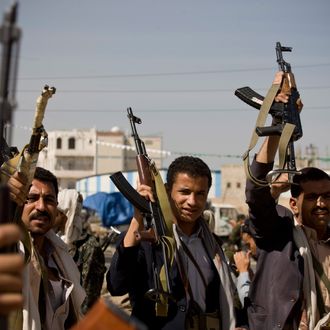
The president and other top members of Yemeni leadership resigned Thursday, days after rebels attacked the country’s presidential residence and palace, sharply escalating the country’s ongoing three-way power struggle. The Houthi fighters, also known as Ansar Allah or Supporters of Allah, have reportedly increased the number of their checkpoints in Sanaa, the capital city, and are looking for members of rival political groups.
In addition, President Abdu Rabu Mansur Hadi, the prime minister, and his cabinet also resigned, apparently to avoid further confrontations with the armed Houthi groups. The parliament — which hasn’t seen an election in a decade — remains, with its speaker having perhaps the most tangible claim to power. That body will discuss the ongoing situation over the weekend, but the AP reports that speaker Yahia al-Rai is an ally of the Houthi rebel groups.
On Monday, Houthis attacked the president’s residence and palace after a government security crackdown in response the kidnapping of the president’s chief of staff over the weekend. The Houthis, who are from Yemen’s Shia minority, are just one of the factions vying for control of the coastal country: Yemen is also the home base of Al Qaeda in the Arabian Peninsula, the terrorist group that took responsibility for the bloody attack on French satirical magazine Charlie Hebdo earlier this month. While the Houthis are anti-AQAP, which they disagree with on religious grounds, they’re also unlikely to be solid allies in the American-led war on terror. Unlike the current government, the rebels are not shy about calling the U.S. out for interfering in Yemen’s internal affairs. Their motto reads: “God is great, death to America, death to Israel, curse on the Jews, victory to Islam.”
The country seems to be slipping deeper into sectarian conflict, and predictably, the internal struggle is amplified by the differing visions of regional powers: Neighboring Saudi Arabia is staunchly anti-Houthi, while Shia Iran supports the rebel groups. ISIS is not a significant player in the country’s political field, though increased polarization along sectarian lines plays into the group’s rhetoric of presenting a pure Sunni Islam to battle the rest of the corrupt world.
At BuzzFeed, foreign correspondent Gregory Johnsen suggests that Hadi’s resignation may be a strategic move, and will eventually lead to a breakdown in the alliance between Houthi leader Abdel Malik Al-Houthi and the country’s former president, Ali Abdullah Saleh. (Saleh resigned in a U.S.-brokered power transition in 2012, at which point Hadi took over.) At the same time, Johnsen cautions, the deepening tensions between various groups can lead to a breakdown along sectarian lines.
As recently as September, counter-terrorism actions in Yemen were hailed as victories by the Obama administration, over the doubts of many experts. “This counterterrorism campaign will be waged through a steady, relentless effort to take out [the Islamic State] wherever they exist, using our air power and our support for partner forces on the ground,” the president said about the battle in Iraq and Syria. “This strategy of taking out terrorists who threaten us, while supporting partners on the front lines, is one that we have successfully pursued in Yemen and Somalia for years.” Yet references to the country were visibly absent from his State of the Union address Tuesday night, even as the president addressed other international challenges.
Meanwhile, AQAP is also gloating about the fall of the government and told the Intercept that “we operate better in such circumstances.”





























